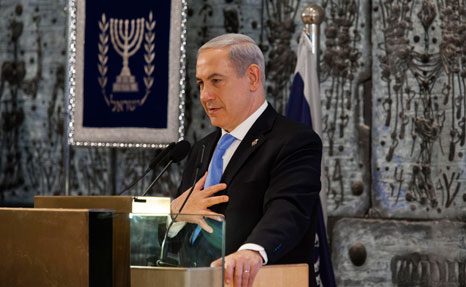Abolish the Presidency? Certainly Not This Way
In an article published on the Mako news site, Dr. Ofer Kenig responds to the initiative to abolish the presidency and asserts that while public debate on the necessity of the institution is legitimate, such discussions must be conducted with due consideration over a period of time, and not as part of a strange and capricious move that tramples on the democratic rules of the game.

The trial balloon that was recently floated by the Prime Minister's Office, which aims primarily at abolishing the presidency, is both ridiculous and sad. It is ridiculous, because it reveals a Prime Minister who is hesitant, indecisive, and motivated by considerations that are peculiar and personal; it is sad, because it is indicative of a dismissive attitude towards the rules of the governmental game, the lifeblood of democracy.
Public discussion of issues related to Israel's system of government is both desirable and necessary. As such, the institution of the presidency is a topic worthy of debate. There is no reason not to put fundamental questions about the presidency on the public agenda, whether they concern the need for the presidency, the scope of presidential powers, the funding of the institution, or the system by which the president is elected. These are all important issues that warrant clarification. Some people believe, for example, that we should abolish the president's power to determine who will be tasked with forming the government following the Knesset elections, and should adopt a system in which government formation will be given automatically to the head of the largest faction. This is a legitimate position that is worthy of discussion. Others think that the hurdle that aspiring presidential candidates must overcome in order to run for office—the need to obtain the signatures of 10 Members of the Knesset (MKs)—is too high; they believe that the citizens of Israel should be able to nominate a presidential candidate, by means such as collecting 50,000 signatures of support. This is also a worthy and interesting topic of discussion. Even the calls to abolish the institution of the presidency completely are not unreasonable, although I do not agree with this position.
The problem with Prime Minister Netanyahu's current attempt to abolish the presidency, thus, isn't the content of the initiative; rather, it is the timing of the move and the motivation behind it. In terms of timing, raising the possibility of abolishing the presidency in the midst of the presidential campaign reflects a dismissive attitude towards the rules of the game. Not only is this effort inappropriate and unfair (imagine what would happen if the referee of a football game were to decide in the 70th minute that the game will be 80 minutes long rather than 90), but it is also sad and dangerous. Woe to the citizens of Israel if this is the personal example that our Prime Minister sets for us with regard to respect for rules.
Admittedly, the current Prime Minister is not the first to model a cavalier attitude towards changing the rules of government: Ehud Barak canceled the limit on the number of cabinet ministers in an expedited procedure, and Menachem Begin passed the Golan Heights Law in a legislative process that lasted just one day. This is the result of a reality in which there is no constitution and there is a tenuous political culture of respecting the rules of the game. Given this context, it is encouraging to hear the objections to the proposed change that have emerged from all sides of the political spectrum.
Beyond the style in which the issue was raised, the current move also raises questions about the motives behind it. Why is it so urgent for the Prime Minister Netanyahu to abolish the presidency? Did something happen in recent weeks that requires this capricious move? Is it possible that the president who is elected will threaten the stability of the Israeli regime? Are the candidates for the position so inappropriate? Obviously, the answer to all these questions is no, and consequently, it is most likely that the motives behind the Prime Minister's move are personal. This initiative, which we can assume that the Prime Minister will denounce and renounce as soon as it is fails, raises questions about the Prime Minister's judgment and resolve. Once again—as in the coalition negotiations, the process of appointing the Governor of the Bank of Israel, and the never ending saga of appointing the chairman of the Knesset Foreign Affairs and Defense Committee—what we see before us is a hesitant prime minister who has a tendency to postpone decisions. The very fact that this procrastination, which is affected by personal considerations, has led to a situation in which a change to Israel's system of government as essential as abolishing the presidency is actually being considered, is a mark of shame for the Prime Minister's leadership.
Dr. Ofer Kenig is a researcher at the Israel Democracy Institute and a senior lecturer at the Ashkelon Academic College.
This article was originally published in Hebrew as "Respect the Rules of the Game" on the Mako news site on May 12, 2014.
